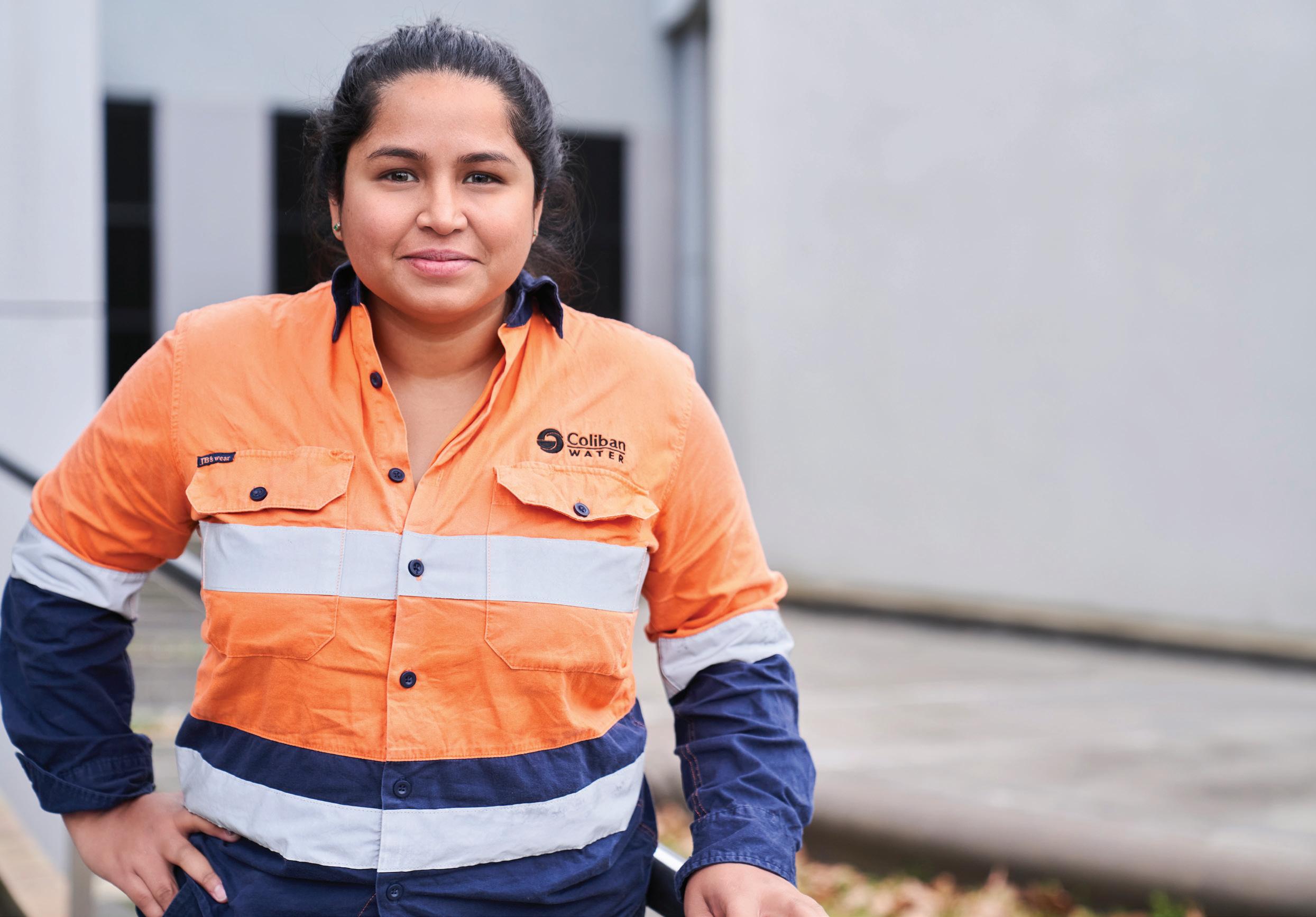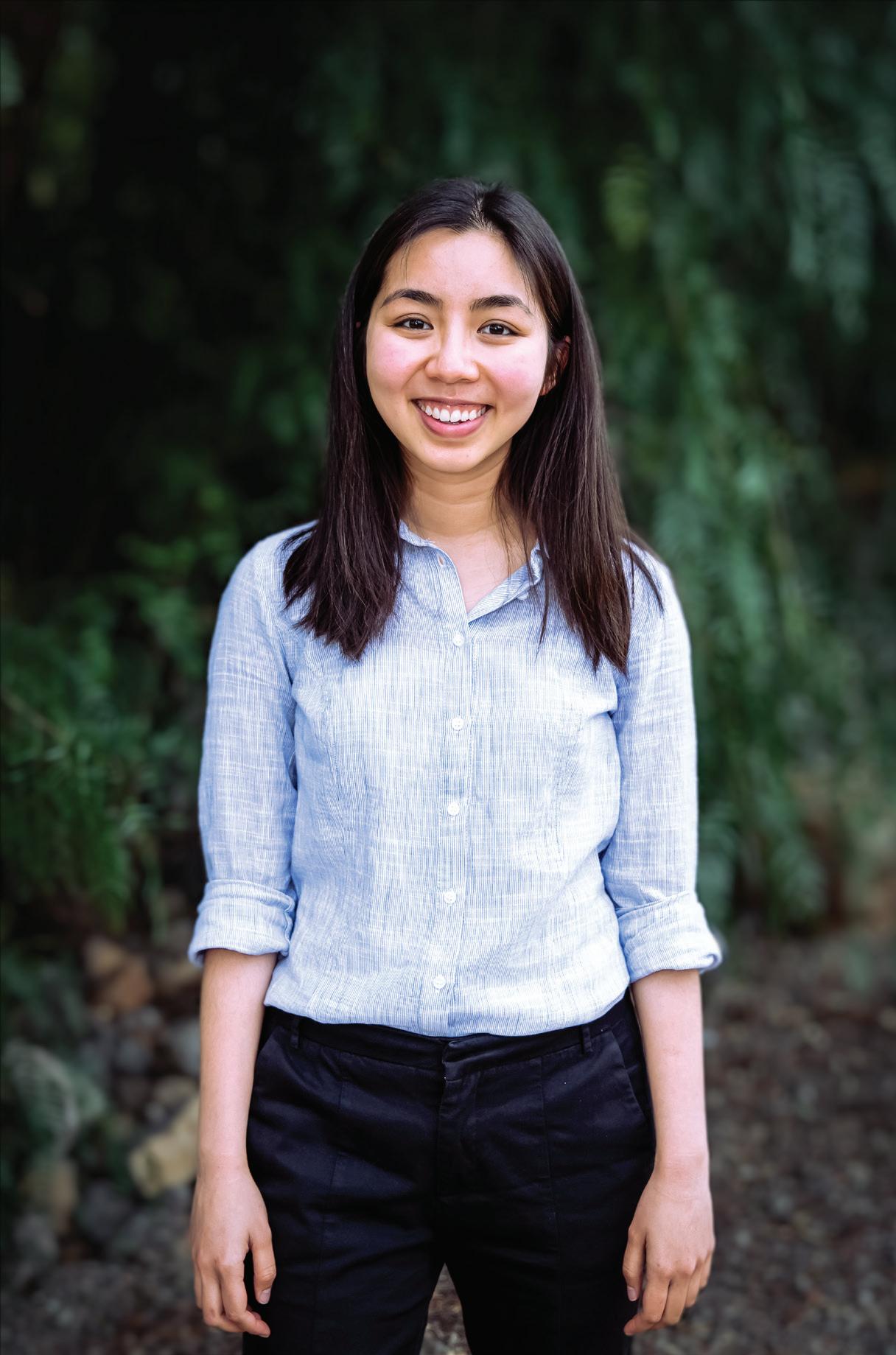
7 minute read
Water wise
Two young women who moved to Australia to study engineering now call Bendigo home, using their expertise to manage and maintain our community’s most precious resource.
By Raelee Tuckerman - Photograph by Leon Schoots
Annie Tu and Nathalie Lopez grew up worlds apart but share much in common. Vietnamese-born Annie and Colombian-raised Nathalie were both inspired to become engineers by a desire to help others; both left their homelands for Sydney to study at the University of New South Wales; both love spending their spare time outdoors. And both took a leap of faith in applying for a graduate program in a regional city they’d never heard of, landing roles with Coliban Water that have enhanced their careers. “I didn’t know anything about Bendigo until I got here,” laughs Annie, a chemical engineering graduate who learned about the scheme while scouting jobs on LinkedIn in 2018. “I’m originally from Ho Chi Minh City – a big city that’s very different to Bendigo, so I had to adapt to the quieter life. But it’s much greener here and I really enjoy the lifestyle I’m developing.” Nathalie, who holds a double major in civil and mining engineering, also found the move to Central Victoria challenging at first, after the hustle and bustle of Sydney and her childhood home of Cali. “I was used to taking buses everywhere in Sydney and that was harder here, so transport was one thing I had to adjust to. Then there was the accent...” Do Bendigonians really sound any different to Sydneysiders? “Yes. In the beginning, I was like, ‘oh my god, I’m having trouble here!’.” But now, not only have Annie and Nathalie settled well into their new surroundings, they’re also making their mark in the local water industry. As part of Coliban Water’s graduate program, they have broadened their horizons working in different areas of the business and experienced the diverse opportunities available in the oftenmale-dominated engineering field.
“My first rotation was in a team looking at water quality, from catchment to tap, which gave me an overall sense of how a water utility operates,” Annie says. “Then I moved to a concept development team looking after designs for new water infrastructure. And my third role was a series of external placements, including with Veolia at the Sandhurst Water Treatment Plant, and GHD in Melbourne, one of our engineering and design partners.” The 26-year-old now works with Coliban’s wastewater treatment team as a process operations engineer and says she has found her calling, drawing on her chemistry and biology background. “I look after the Epsom Wastewater Treatment Plant,” she says, explaining that wastewater treatment is a dynamic process requiring planning and problem-solving. “You don’t just press a button and let it run; it changes throughout the day, the month and even the seasons. “Flows into the plant increase and slow at different times throughout the day, so we need to account for that. We also use live microbes in our biological nutrient removal process to treat the water and they change throughout the seasons (in summer they like the warmth and run well but in winter they’re not as active). And wind or heavy rainfall stirs up turbidity in the lagoons, so filtration needs change and we occasionally need to use more chemicals to get rid of the solids.” Annie has also travelled back to Vietnam with a Coliban delegation to observe operations at ‘twin organisation’ Phu Tho Water – as an interpreter, rather than engineer. “I didn’t know Coliban was doing that kind of work but it helped me be even more certain I’d made the right choice coming here. I like the social impact of engineering and am hoping to do some aid work for people in developing countries, working on clean water and sanitation projects. So getting that exposure three months into my first job was great confirmation for me.” Nathalie was drawn to the public water industry after initially taking a job with a private firm in 2017. “But I felt it was very money driven and that didn’t sit well with what I wanted to do as an engineer, which was helping people and communities,” the 31-year-old says. “I thought the best way for me to do that in Australia was to work for a council or water corporation. Then I heard about Coliban’s graduate program and there were some openings. “I started in networks operations, which involves operating and maintaining the network (pipes, pumps and other infrastructure) from the treatment plants all the way to the tap, and from the toilet to the boundary of wastewater treatment facilities.” Nathalie’s rotations included the treatment team and Veolia’s desalination plant in Sydney. She now has moved into a full-time role as a water networks operations engineer. “We look at how the network operates to optimise it or prepare for rain, which can get into sewer mains and cause issues. We do maintenance/cleaning of the networks, and try to address customer concerns, like when people tell us their house smells, or their tap water tastes a little different.” Coliban Water‘s graduate engineer program has operated for about 12 years, partnering with universities including La Trobe and attracting applicants from across Australia and internationally. Eight different rotations are available, with participants usually spending several years moving through various teams before accepting full-time roles within the business or externally. “Some of our graduates have taken on senior management positions within the organisation, so it’s been a nursery of technical skills for Coliban Water,” says chief assets and service delivery officer Danny McLean. “Some have gone into other local or national organisations providing water and wastewater services and others now work for our contractors. “We have a diverse group; a great mix of males and females and cater for all disciplines, including chemical, environmental, biological, mechanical, civil and electrical engineers. They have the chance to work in areas like construction, operations, IT and control systems, right across the water cycle. “Our graduates discover their own niche, whether they’re best suited to construction, project management, operations, data analysis or other highly technical work. In return, we develop a workforce ready to step up into senior roles, with new ways of looking at some of our challenges.” Annie and Nathalie are aware of the push to encourage more girls to consider Science, Technology, Engineering and Maths (STEM) careers in Australia, but say gender was never an issue for them. Annie’s father is an engineer. She always knew it was an option for her, and never felt any negativity about her choice of profession. Nathalie says female participation in engineering in Colombia is about 36%, three times the rate here. “When I moved to Australia, the change was significant,” says Nathalie. “It’s not an easy issue to solve, but working in this field and being able to inspire other girls is really good. “I would say to them, don’t be put off by thinking engineering is all about numbers. At university, yes, but you can learn maths with good teaching. Uni is just the first step – when you get into the workplace, you discover that numbers are not what makes engineering. It’s about critical thinking, problem solving, hands-on experience and making an impact on the community.” Annie agrees. “I grew up knowing what engineers do. If there’s a flood and someone designed a house that floats, you instantly think ‘an engineer did that’. Perhaps because we have more hardships in developing countries, we look at most of the innovations that help people’s daily lives, and know there’s an engineer involved in some aspect.” They urge anyone considering an engineering career to explore the possibilities and, if they have the chance, shadow some engineers on the job to learn more about exactly what they do. “It’s not even about being a girl in STEM; it’s about doing what brings you joy,” concludes Annie. “I like working in an environment where I can solve problems and see the results as they happen. I see how my work changes processes, resulting in better water quality or more efficiency. If I do this work for the next 40 years, I’ll be happy and comfortable because I know I’m making a difference.” Vacancies in Coliban Water’s graduate engineer program occur regularly. Expressions of interest can be forwarded to careers@coliban.com.au






